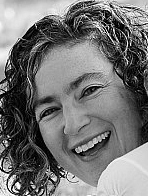 Mara Acel-Green, LICSW, has worked extensively with people in need of support, including at-risk adolescents, substance users, pregnant teenagers, adults seeking jobs, and lesbian, gay, bisexual, transgender and questioning (LGBTQ) youth. A social worker by training, her professional life has spanned the full range of nonprofit work, from collaborating with clients, to directing clinical services, to management roles—giving her a wide range of experiences to draw upon as she guides students in the Master of Science in Nonprofit Management program.
Mara Acel-Green, LICSW, has worked extensively with people in need of support, including at-risk adolescents, substance users, pregnant teenagers, adults seeking jobs, and lesbian, gay, bisexual, transgender and questioning (LGBTQ) youth. A social worker by training, her professional life has spanned the full range of nonprofit work, from collaborating with clients, to directing clinical services, to management roles—giving her a wide range of experiences to draw upon as she guides students in the Master of Science in Nonprofit Management program.
“My favorite part of the program is meeting people who are at the beginning of their nonprofit track,” Acel-Green says, “and giving them a unique lens through which to look strategically at the classes they need to take to bridge any gaps between what they know and what they need to know.”
Acel-Green teaches the online course, “Theory and Practice of Human Services,” three times a year to students from around the country, and sometimes overseas, who are interested in bringing nonprofit work and human services to their communities. Many of her students are already working on the front lines of human services in shelters, clinics, and residential programs, and are now looking to enter management. The course also occasionally attracts managers transitioning from the for-profit to the nonprofit world and former military personnel looking to re-engage in civilian life.
At the beginning of the six-week course, Acel-Green’s students write a professional learning statement to help them work out what they each need to do for themselves throughout their time at Northeastern to shore up any gaps in their knowledge.
“Let’s say I have a student with a lot of direct service experience in the human services field but no writing, budgeting, or supervisory experience,” she says. “We will map out together how she will best use what she is learning in this class, as well as what other classes she may need to take, so that when she graduates, she will be eligible for the managerial jobs she is seeking.”
Assessing an Organization
Central to the coursework is a thorough assessment of an existing nonprofit agency in the student’s community. First, students spend four weeks learning interview skills and studying diversity, best practices, budgets, money flow, and mission and vision statements. By the fifth week of the six-week course, they are ready to interview a senior nonprofit manager, and are encouraged to choose a nonprofit that interests them professionally.
They first visit the organization to gauge its staffing, mission, and outreach efforts. Is there diversity among the staff? Are flyers in multiple languages? Then using all the components they have learned throughout the course, the in-person interview with the organization’s manager provides the chance to assess the strengths and challenges of the chosen organization, from budgeting and staffing to whether the programs support the mission and vision of the nonprofit.
“This process gives students the chance to look critically and thoroughly at an organization, so they will have a strategic, rigorous approach as they develop their professional life,” Acel-Green says. “It’s also a chance to network. Some of my students have been offered a job or internship as a result of these interviews.”
In addition to teaching, Acel-Green is the founder of Strong Roots Counseling in Watertown, Massachusetts, a general practice for adolescents and adults, with specialty treatment for pregnancy or postpartum. An expert in this field, Acel-Green also leads trainings for clinicians, childbirth professionals, and families, and speaks at conferences around the country about postpartum depression, an under-diagnosed health condition affecting millions of women today. Acel-Green’s writing can be seen on The Huffington Post, as well as her website, Maragreen.com. She also facilitates “Clinical Conversations,” a discussion series convening local perinatal clinicians to discuss best practices and challenges facing the perinatal population.
Her dedication to the population she serves is mirrored in her students’ commitment to under-served communities.
“It’s thrilling to teach people interested in a field you are passionate about and see them shift in such a short period of time,” Acel-Green says. “They come to realize the value of networking and how much help they can get from each other as they face challenges at work.”
Acel-Green continues:
One student may say that he is struggling to find college funds for kids who are transitioning out of state care, while another is looking for housing for veterans who are returning home. They find that they can share and collaborate. They may not be serving the same populations, but the needs are similar and the over-arching question about how we get the right services to the right people remains the same. From identifying available services to understanding policy changes, it’s all about finding creative solutions to complex problems. By the end of this course, my students are very adept at that.





Related Articles
Why Earn a Professional Doctoral Degree?
5 Tips to Get the Most out of Grad School
Is Earning a Graduate Certificate Worth It?